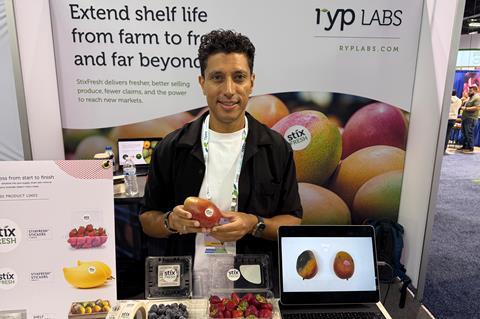US company Ryp Labs has big ambitions for its StixFresh technology

A sticker that significantly extends the shelf life of fresh produce is promising to be a game changer in the fight against food waste.
US startup Ryp Labs has developed StixFresh, a sticker that slows down the natural process of fruit spoilage that is typically accelerated by changes in temperature and humidity.
The company says its technology has the potential to extend shelf life from anywhere from 40-100 per cent, depending on the product.
“Food waste is a social, economic and environmental problem,” Ryp Labs’ CEO Moody Soliman told Fruitnet at the recent Global Produce & Floral Show (GPFS) in Anaheim, California. “So we figured that if we’re going to have a real impact, we have to come up with a solution that is very easy to use, available, and can be applied anywhere in the supply chain.”
The Seattle-based company – which has an R&D lab in Portugal and an office in Belgium – developed a formulation that can go on almost any surface, including a sticker. That sticker is applied either to an individual fruit or a fruit punnet, and it then releases bioactives that inhibit fungal growth.
How does it work?
Ryp Labs’ plant physiologists and microbiologists work to identify the specific compounds that are going to combat the diseases that affect particular fruits.
Its chemical engineers and material scientists then develop a formula to control the release rate of those compounds that can be added to a sticker.
“So essentially what we’ve done is taken how plants have been protecting themselves for millions of years to extend the shelf life of fresh produce,” Soliman explained.
With small fruits such as berries it’s not necessary to put a sticker on every fruit – rather a single sticker on the inside of the clam shell packaging is enough, he said.
So far Ryp Labs has created solutions for berries and exotic fruits such as mangoes and dragon fruit, but eventually Soliman says there is the potential to apply the technology to all fresh produce and flowers.
Seeking new customers
Ryp Labs was founded eight years ago and spent the first five years in the R&D phase, before spending two further years carrying out field trials. This is the business’s first full commercial year.
There have been early adopters of the technology in South and Central America, as well as south-east Asia, and the company’s first customer was Walmart in Costa Rica on strawberries. The reason it’s proven particularly popular in those regions is that those countries are shipping high-value, perishable produce long distances to customers in the UK, US and Japan, Soliman explained.
StixFresh stickers are sold under a volume-based pricing structure, with reductions based on larger orders. Customers can add the coatings to their own branded stickers.
No regulatory issues
Soliman – an engineer who started his career in medical devices – said that StixFresh is already ready to be sold around the world: “Coming from the medical device industry, one of the first things we’ve learned is if you’re going to develop a technology, you don’t develop it and then look at the regulatory route, because that could be a nightmare,” Soliman explained.
“You can develop the coolest technology and find out that it’s going take six years and $50 million to get it through regulation. So you have to look at the regulatory strategy beforehand, and that’s exactly what we did with this technology. We figured out that to be able to break into the market as quickly and as seamlessly as possible, we would only work with food-grade, pre-approved products.
“So everything we use in the sticker today is either pre-approved as food packaging, active food packaging, food additives or food flavourings. Our compounds are compounds that you find in your food every day. Our stickers are actually edible – we don’t recommend that you eat it, but if you do you’re going to be perfectly safe.
“That’s enabled us to enter the markets with almost no regulatory hurdle – that’s the case in the US and Europe, and of course in South and Central America it’s usually a very straightforward path. So we don’t get pre-market approval and don’t necessarily need a certification because everything we use is already in the food system.”
Ryp Labs is now looking to raise additional funds, spread the word about its technology and build its customer base, with a goal of reaching profitability by 2029.



